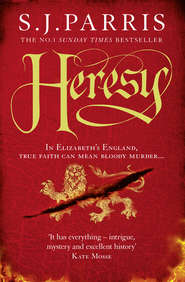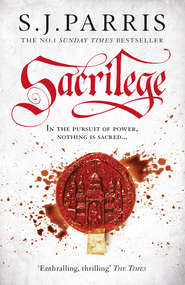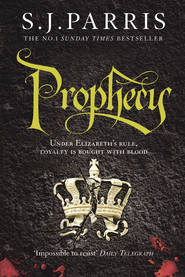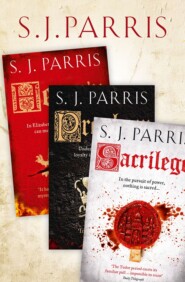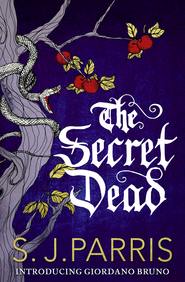По всем вопросам обращайтесь на: info@litportal.ru
(©) 2003-2024.
✖
Treachery
Автор
Год написания книги
2019
Настройки чтения
Размер шрифта
Высота строк
Поля
‘Robert Dunne. Dear God. I am most sorry to hear of it,’ Knollys says, slumping back against the wall, shock etched on his face. ‘He was a good sailor, even if—’ He breaks off, as if thinking better of whatever he had been about to say. So this accounts for the subdued atmosphere among the men.
‘The how is more difficult,’ Drake says, and his brother reaches a hand out.
‘Francis—’
‘They may as well know the truth of it, Thomas, since we can go neither forward nor back until the business is resolved.’ He pours himself another drink and passes the decanter up the table.
‘Dunne was found hanged in his quarters,’ Drake continues. ‘You may imagine how this has affected the crew. They talk of omens, a curse on the voyage, God’s punishment. Sailors read the world as a book of prophecies, Doctor Bruno,’ he adds, turning to me, ‘and on every page they find evidence that the Fates are set against them. So a death such as this on board, before we have even cast off …’
‘Self-slaughter, then?’ Knollys interrupts, nodding sadly.
‘So it appeared. A crudely fashioned noose fastened to a ceiling hook.’
‘But you do not believe it.’ I finish the thought for him.
Drake gives me a sharp look. ‘What makes you say that?’
‘I read it in your face, sir.’
He considers me for a moment without speaking, as if trying to read me in return. ‘Interesting,’ he says, eventually. ‘Robert Dunne was a solid man. An experienced sailor.’
‘He was a deeply troubled man, Francis, we all know that,’ Knollys says.
‘He had heavy debts, certainly,’ Drake agrees, ‘but this voyage was supposed to remedy that. It would make no sense to die by his own hand before we set sail.’
‘A man may lose faith in himself,’ Sidney says.
‘In himself, perhaps, but not in his God. Dunne was devout, in the way of seafaring men. He would have regarded it as a grievous sin.’ Drake pauses, holding up a warning finger, and lowers his voice. ‘But here is my problem. I have allowed the men to believe his death was self-slaughter, as far as I can. They may talk of inviting curses and Dunne’s unburied soul plaguing the ship, but I had rather that for the present than any speculation on the alternative.’
‘You think someone killed him?’ Sidney’s eyes are so wide his brows threaten to disappear. Drake motions for him to keep his voice down.
‘I am certain of it. He did not have the face of a hanged man.’
‘So he was strung up after death, to look like suicide?’ I murmur. ‘How many people know of your suspicions?’
‘The only ones who saw the body were the man who found him, Jonas Solon, and my brother Thomas, who I sent for immediately. I also called the ship’s chaplain to ask his advice. He offered to say a prayer over the body, though he said there was little he could do for a suicide in terms of ritual.’
‘But no one else thought the body looked unusual? For a suicide by hanging, I mean?’
‘If they did, they said nothing. I only voiced my disquiet to Thomas in private later and he said he had thought the same.’ Drake takes a mouthful of wine. The strain of anxiety is plain in his face, though he is doing his best to conceal it.
‘Dunne did not show the signs of strangulation, though it was evident he had been hanging by the neck for some time,’ Thomas says, keeping his voice low. ‘The eyes were bloodshot and there was bruising around his nose and mouth. But he did not have the swollen features you would expect from choking.’
‘My first thought was to have him buried at sea that same day, to spare him the indignity of a suicide’s burial,’ Drake continues. ‘But Padre Pettifer, the chaplain, and my brother here talked me out of it – though the death happened aboard my ship, we are still in English waters and it would be folly to disregard the legal procedures. Besides, we could hardly keep it a secret. So I had him rowed ashore and handed over to the coroner. A messenger was dispatched to his wife the same day – Dunne was a Devon man, his family seat no more than a day’s ride away. The inquest will be held in three days, to give her time to travel.’ He twists the gold ring in his ear. ‘You see my difficulty, gentlemen? If Dunne was killed unlawfully, I must find out what happened before we set sail, but without jeopardising the voyage.’
‘You mean to say it could have been someone in the crew? He might still be here?’ Sidney asks in an awed whisper.
‘This is what we must ascertain, as subtly as possible,’ Drake says. ‘For my part, I do not believe any stranger could have done it. We have a watch throughout the night and they swear no unknown person came aboard after dark.’
‘If it was someone among your men, surely it is all to the good that he believes the death is taken for a suicide?’ Knollys says. ‘He will think himself safe, and perhaps make some slip that will give him away.’
‘That is my hope. Either way, we cannot sail until this is resolved.’ Drake pinches the point of his beard and frowns. ‘He may strike again.’ He glances at his brother. I wonder if he has some particular grounds for believing this. ‘But neither do I want the inquest to conclude that Dunne was murdered and set the coroner to investigate it. The fleet could be delayed indefinitely then. Men would desert. The entire expedition could be finished.’ He looks to Sidney as he says this. Given how many of Sidney’s friends and relatives at court have invested in this voyage, he knows as well as Drake what is at stake. He nods, his face sombre.
‘But the family will not want a verdict of felo de se,’ Knollys murmurs. ‘It would mean he died a criminal and his property would be forfeit to the crown. If there is the slightest doubt, his widow would surely rather it were treated as unlawful killing. At least then there is the prospect of justice.’
‘The coroner must reach a verdict of felo de se,’ Drake says sharply, ‘or we are looking at sixty thousand pounds’ worth of investment lost.’ He waves a hand towards the window, where the other ships of this expensive enterprise can be seen rising and falling on the swell. ‘To say nothing of the faith of some of the highest people in the land, including the Queen herself. This is the largest private fleet England has ever sent out. If we should fail before we even leave harbour, I would never again raise the finance for another such venture. I must determine whether there is a killer aboard my ship before the inquest.’
‘And what will you do when you find him?’ Sidney asks.
‘I will decide that when the time comes.’
Knollys looks as if he is about to offer another argument, but at the sight of his commander’s face he falls silent. I watch Drake, fascinated by his flinty expression. To lead a company of ships and men to the other side of the world must require a character that inspires loyalty. But what other qualities must it demand? Ruthlessness, in no small measure, I imagine; the willingness, if necessity forces your hand, to declare that the law is whatever you say it is. On board a ship, thousands of miles from shore, you must believe yourself the king of your own small kingdom, and keep your subjects obedient by any means necessary. You would have to act without compunction, and make your decisions without wavering.
‘Why before the inquest?’ Sidney asks.
‘I was mayor of Plymouth four years ago,’ Drake says. He rests his elbows on the table. ‘I know how the functionaries of the Town Corporation work. The Devonshire coroner could not find a felon if one were hiding behind his bed-curtains. The kind of ham-fisted investigation he would carry out aboard my fleet would achieve nothing but to sow discord and mistrust among the crews and allow the killer every chance to escape. No.’ His right hand closes into a fist and the muscles tighten in his jaw. ‘I mean to find this man myself.’
He looks around the company as if daring anyone else to question his judgement. The others lower their eyes; there is a prickly silence.
‘How many men do you have on board the Elizabeth?’ I ask.
‘At present, while we wait in harbour, around eighty men,’ Drake says.
‘And no one saw or heard anything? It would seem strange, on such a busy ship, that a man in good health could be subdued and hanged in his own cabin without anyone hearing a disturbance.’
Drake looks at me. ‘You are right. But Dunne was very drunk the night he died. He had gone ashore with a few of the others. They said he was acting strangely even before they had come within sight of a tavern.’
‘Strangely, how?’
‘Some of the men said he had a blazing argument in an inn yard, ending with punches thrown on both sides. Then Dunne stormed away and the others didn’t see him again until later. Padre Pettifer, our chaplain, found him wandering in the street and brought him back to the ship. Thomas met them as they were trying to climb aboard.’
‘I was returning from dinner with Francis,’ Thomas says. ‘I thought only that Dunne was extremely drunk. He was swaying violently and his talk was very wild.’
‘In what way?’
‘Like a man in the grip of fever. He kept saying they were at his heels, and pointing out into the night.’
‘Who was at his heels?’ Sidney says, leaning forward. Thomas glances at him with disdain.
‘Well, if he’d said, we might have a better idea of who to look for.’ He jabs a forefinger into the air. ‘He just kept pointing like a madman, like so, and saying “Do you not see him, Thomas Drake?” When I asked who, he opened his eyes very wide and said, “The Devil himself.”’
‘Did you notice anything about his eyes?’ I ask.
‘His eyes? It was dark, man,’ Thomas says. Then he seems to relent. ‘Though in that light they appeared very bloodshot, and the pupils dilated. The eyes of a drunken man, as you’d expect.’ He sucks in his cheeks. ‘It is strange. Dunne had his faults, but the bottle was not one of them. It had clearly gone to his head – he even started addressing me as his wife—’
‘God help her, if you are easily mistaken in looks,’ Sidney says. Thomas glares him into silence.
‘I helped him to his cabin. Told him to sleep it off. Just before we reached the door, he pointed ahead and said, “Martha, why have you brought that horse aboard this ship?” Then he vomited copiously all over the deck and his legs went from under him.’






